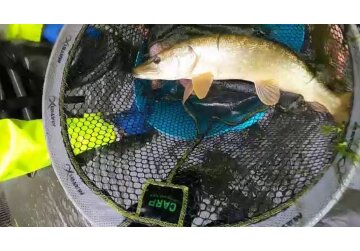
River fish being moved in struggle to survive low water levels
It is a drastic move and some of the fish won't survive it, but they will have a better chance than if they had remained where they were.
Despite the rain, the Mole in Surrey still looks more like a gravel track, than a river.
A few deep pools remain along its course, in which the river's typically healthy fish population is now corralled by the lowest water levels many on this river can remember.
After holding off until the last minute, the Environment Agency has now decided to wade in and rescue fish in some of the most rapidly vanishing pools and move them to other parts of the river.
Environment Agency workers are moving fish on the River Mole, as the low water levels are dangerous for them. Pictured is EA fisheries officer Joe Kitanosono, who is leading the operation.
EA fisheries officer Joe Kitanosono, who is leading the operation, said they have thought carefully before wading in.
"We've looked at every single other option," he said.
"We can see the levels aren't going to improve even with the rain we've just had.
"Then we have to take the ultimate step of removing the fish."
His team use a technique called electro-fishing where a current is run through the water to temporarily stun the fish.
One person waves the hoop carrying the electricity through the water, several other wade behind, scooping up the fish.
The fish are then rushed via buckets to tanks full of oxygenated water.
Environment Agency workers are moving fish on the River Mole, as the low water levels are dangerous for them.
Environment Agency workers are moving fish on the River Mole, as the low water levels are dangerous for them.
It's a drastic step. The fish are already stressed by a lack of oxygen and high temperatures in the small pools to which they've been confined for weeks.
Manhandling them out of the river only stresses them more. Around 20% of fish removed might die. But that's far better odds than they had staying in the river.
And compared to the situation on other rivers up and down the country, the fish on the River Mole are lucky.
The River Wye on the Welsh/English border is a case in point.
It's home to some of our most vulnerable fish populations, such as salmon and sea trout that must migrate the length of the river.
Salmon there have been dying for weeks, not just because of falling water and oxygen levels, but because of levels of pollution too. As water levels drop, concentrations of pollution go up.
We joined Marian Wilding Jones, one of a network of citizen scientists monitoring pollution levels on the River Dore, a tributary of the Wye.
Things have been bad on the river for a while, lined as it is by cattle and poultry farms which add to existing pollution from sewage treatment works. But the drought has made them even worse.
According to her measurements, levels of phosphate - a key pollutant - are eight to nine times the target level.
"It's become quite distressing, and almost a full-time job now," said Ms Wilding Jones.
Environment Agency workers are moving fish on the River Mole, as the low water levels are dangerous for them.
She is pleased the Environment Agency now uses her data in its monitoring.
The agency has been criticised for having inadequate pollution monitoring in place on England's rivers, an absence that has been even more noticeable during the drought.
In a statement, the Environment Agency told us: "We need to improve the water quality and ecological health of our rivers and monitoring has a vital part to play in this."
It said it has spent over £180m on environmental monitoring since 2016, adding: "We've also placed new requirements on water companies to significantly increase their monitoring."
However, campaigners argue key agencies need more support to address the scale of the issue.
"Not enough is being done," said Jamie Audsley, chief executive of the Herefordshire Wildlife Trust.
"Our key regulators, Environment Agency, and Natural England are underfunded.
"We need action from politicians, from regulators, and to use the key hooks in our legislation around the Environment Act to have targets that will make sure that in terms of sewage output, agricultural chemicals, and indeed, storm surge, that those things are held to account properly for the long term."
news.sky.com







